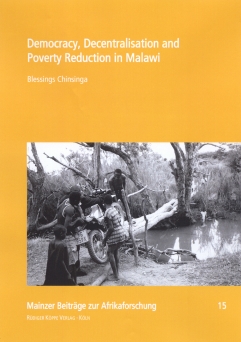


In this book, Blessings Chinsinga examines whether democratic decentralization promotes successful poverty reduction policy as is the hope of many development policy actors. Since the regime changed to multi-party democracy in 1994, combating poverty became a focus of national, economic and social policy in Malawi. However, implementing this policy has not been easy.
The central – political – problem of land scarcity is rarely explored by the donors who control this policy field and whose approaches tend, as elsewhere in the Global South, to depoliticize development. And as a result of competition between donors, the various programmes and initiatives implemented since 1994 are, more often than not, incompatible. The decentralisation policy which, again, was primarily a donor initiative faced similar problems: the transfer of responsibilities to the local level remained significantly behind the original schedule; the legal framework of the decentralisation process was inconsistent and incomplete and has not been fully implemented to the present day.
The institutions established at national level to accompany the decentralisation process tend to work more against than with each other; the practices of NGOs – a political force that originally provided strong support for this process – undermine the functionality of the decentralized entities that have been created; and “traditional chiefs” and parliamentary representatives have managed to “capture” the decentralisation process, by marginalizing the elected district councillors. In other words, the particular way in which multi-party democracy works at national level in Malawi blocks the process of democratic decentralization at local level.
Chinsinga’s solid empirical study succeeds in injecting a welcome shot of realism into the decentralisation debate which is carried over long distances by highly unrealistic hopes and expectations – an observation which would seem to be applicable not only to Malawi, but to many African countries.
Review in “Portal für Politikwissenschaft”
About the author:
Born in 1973, Blessings Chinsinga holds an Mphil from University of Cambridge, UK and PhD from the Institute of Anthropology and African Studies, University of Mainz, Germany. He is currently based at the Department of Political and Administrative Studies, Chancellor College, University of Malawi as an Associate Professor.
Kathleen Klaus in African Studies Review, 52/1/2009, 201-202
Heiko Meinhardt in Verfassung und Recht in Übersee, 2/2009, 292-294
Der Erfolg der einstigen asiatischen Entwicklungsländer bei der Industrialisierung ist auch für die politikwissenschaftliche Debatte der Entwicklungstheorien nicht folgenlos geblieben: Ansätze, die auf endogene institutionelle Reformen setzen, haben mit den asiatischen Beispielen gegenüber solchen Theorien, welche die asymmetrische Integration in die Weltwirtschaft als Ursache für Unterentwicklung sehen, starke Argumente gewonnen. Wie aber wirken Ansätze institutioneller Modernisierung konkret? Und bieten sie auch für Afrika eine Chance? Neben Demokratisierung, marktwirtschaftlicher Öffnung und Rechtsstaatlichkeit, die als grundsätzliche Reformziele gelten, wird in diesem Buch auf das Thema der Dezentralisierung abgehoben. Untersucht werden diesbezügliche Reformen in Malawi. Deutlich wird, dass die Verlagerung von Entscheidungskompetenzen auf regionale und vor allem lokale Ebenen für eine verbesserte Wahrnehmung der sozio-ökonomischen Probleme sorgt. Interessant ist das Ergebnis, dass dieser Prozess der Entscheidungsverlagerung oftmals fälschlich als Nullsummenspiel verstanden wird. Dies ist ein möglicher Hinderungsgrund für seine Umsetzung, obwohl die Studie belegt, dass vielmehr gänzlich neue Handlungsräume hinzugewonnen werden. Insofern hat die Dezentralisierung in Malawi für eine neue Entwicklungsdynamik gesorgt.
Carsten Michael Nickel in Portal für Politikwissenschaft, http://pw-portal.de/rezension/9044-democracy-decentralisation-and-poverty-reduction-in-malawi_33528, 1
© 2026 by Rüdiger Köppe Verlag – www.koeppe.de